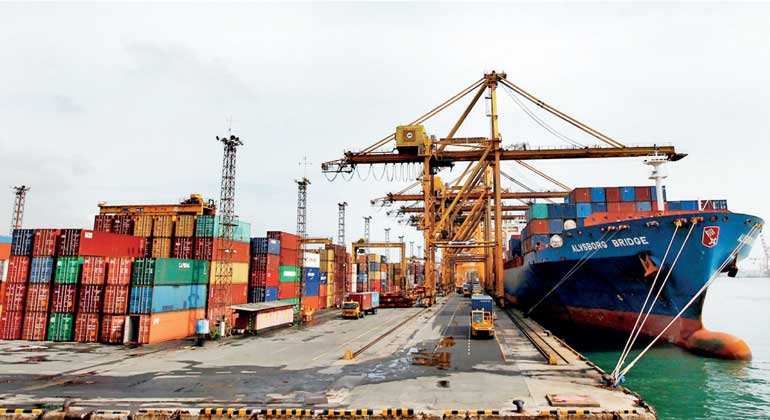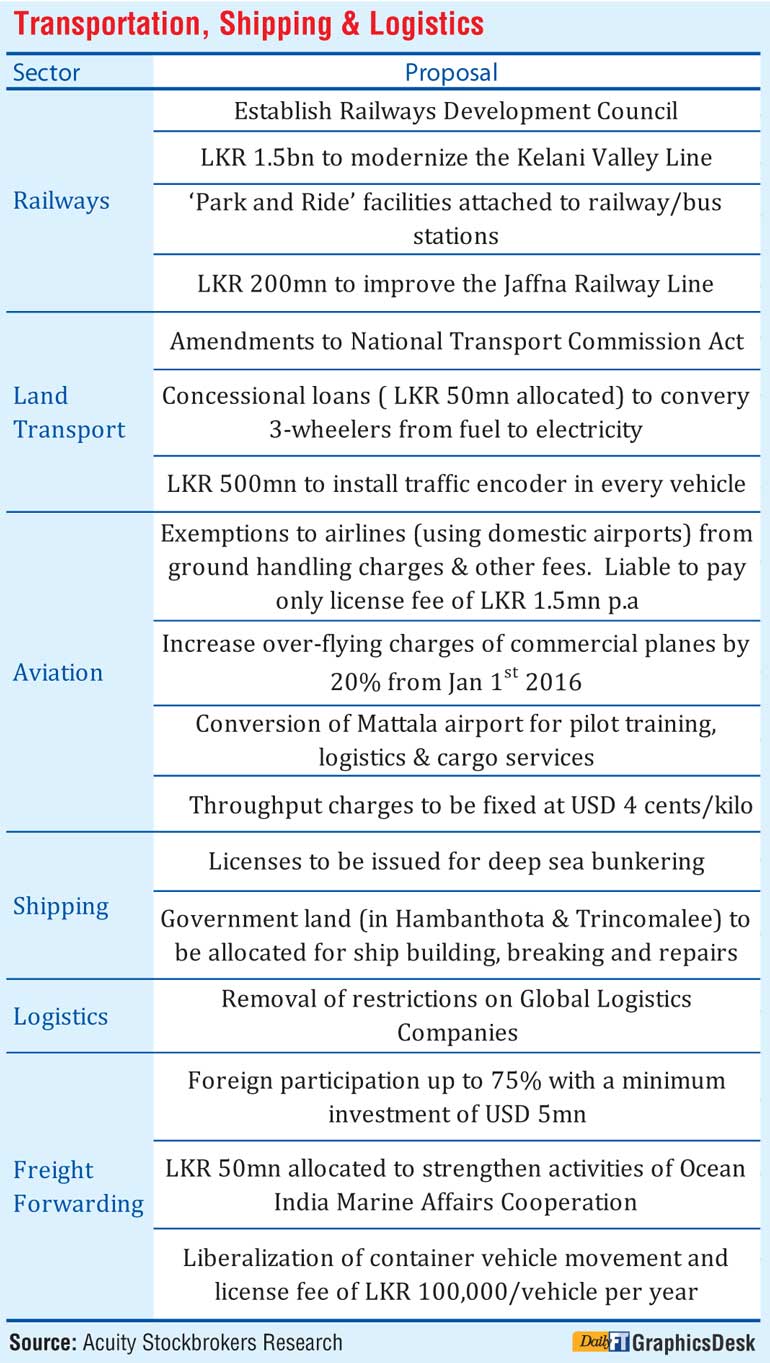Tuesday Feb 17, 2026
Tuesday Feb 17, 2026
Monday, 23 November 2015 00:00 - - {{hitsCtrl.values.hits}}

The shipping and logistics industry has gotten a boost from the 2016 Budget presented on Friday by the Unity Government.
“Given Sri Lanka’s geographical location is in close proximity to the key shipping routes that connect the East to the West, and as such the potential to create a Maritime Hub is enormous,” said Finance Minister Ravi Karunanayake.
In that context, he emphasised that it was important that Sri Lanka augments into the global value chain and a maritime hub offers greater opportunities. In this regard, it will be important to create the enabling environment to attract ship owners to the country in a manner which builds a maritime economy, he added.
“The business of trans-shipment and non container related shipping has to be increased to maintain a major trans-shipment hub. Hence, we need to set a realistic target to be within the top 20 trans-shipment ports in the world by 2025,” the Finance Minister told Parliament.
The terminal operators will be dependent on the ship owners for this purpose and the country will need the business to grow to recover the investments made in the sector through public investments. The Government will also encourage ship financing, ship repairing, ship registry status, bunkering, arbitration and allied services which would be governed by modern laws. The competition for such business is increasing in the region.
Considering the country’s geographical location, there is immense potential in engage in sea marshalling activities. In this regard, the Finance Minister encouraged the private sector to venture into suitable collaborations with the Sri Lanka Navy.
The Government’s intention to make Colombo a logistics hub was also shared during the 2016 Budget presentation.
“We will remove restrictions on global logistics companies, which have the scale, capacity, capital and knowledge to expand services using Sri Lanka as the hub, they should be able to invest, acquire and operate within a reasonable tax regime where new capital, business and employment are generated to the local economy via global trade. Also, regulation will be issued to stipulate designated areas for logistics hub and these areas will be strictly outside the BOI zones,” the Finance Minister said.
Entry into international freight forwarding will be liberalised as well, Minister Karunanayake said so that foreign participation could extend up to a maximum of 75% with a minimum investment of $ 5 million. “But such companies should have at least 90% of local employment,” he added.
The 2016 Budget also proposed that the freight forwarding activities be expanded to sea ports as well and operate jointly with the Sri Lanka Ports Authority.
Since container vehicles entering the Sri Lanka Ports Authority premises are subject to bureaucratic red tape, the Government will liberalise the vehicle movement activities and introduce a license fee of
Rs. 100,000 per vehicle a year.
In order to encourage safe, speedy and orderly export and trans-shipment facilities, Finance Minister also requested the customs authorities of regional countries to send their officials to work hand-in-hand with Sri Lanka Customs officials. “With their presence, exports and trans-shipments bound to respective countries can be cleared expeditiously,” he added.
In future, duty free shops at ports and airports should be operated on a joint venture basis with local or foreign counterparts. Accordingly, any local operator who intends to enter into this business should have a foreign counterpart and vice versa.
To suit the present day requirements in international trade activities, a new Customs Law in place of existing Customs Ordinance will be presented to the Parliament, the Finance Minister assured.
Hambantota port
Measures to boost prospects of Hambantota port were also announced.
“The Hambantota sea port also has not stood up for what it is meant for and could be termed as a sea port to berth only a limited number of ships or a sea port with fewer ships. However, the name of the promoter lives on as the name boards to these locations of vast expenditure and waste, to bring out his name for the benefit of visitors who on and off embark on sightseeing,” Finance Minister Karunanayake said during his speech.
However, he acknowledged that the sea route passing Hambantota port is used by nearly 35,000 ships including 4,500 oil tankers annually. “At present our bunkering industry caters to only a few ships annually. As such, given the enormous potential, I encourage the private sector to engage in deep sea bunkering, for which licenses will be issued through a competitive transparent bidding process,” the Finance Minister said.
To encourage shipbuilding, ship-breaking and ship repair activities, the 2016 Budget also proposed to allocate Government land in Hambantota and Trincomalee.
Others measures included:
